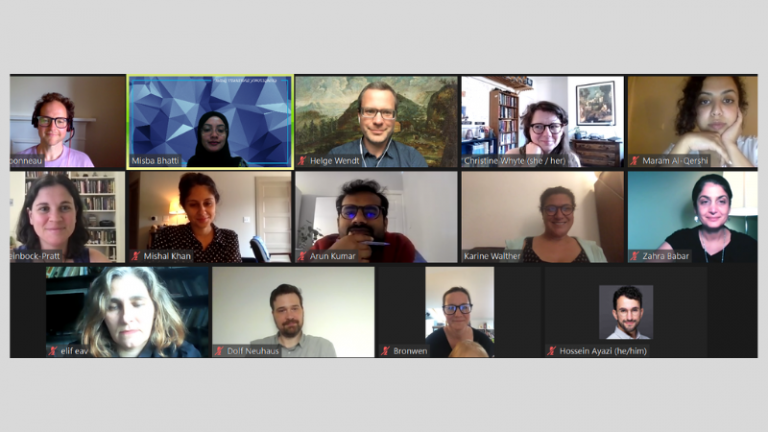American Studies, CIRS Faculty Research Workshops, Race & Society, Regional Studies
The Gospel of Work and Money: Global Histories of Industrial Education Virtual Working Group IV

On June 29, 2021, the Center for International and Regional Studies (CIRS) convened the fourth virtual workshop under its research initiative on The Gospel of Work and Money: Global Histories of Industrial Education. During this paper workshop, three project contributors presented their draft papers and received in-depth feedback from the group.
Dr. Arun Kumar initiated the discussion with the presentation of his paper titled, “Christian Labour and the Cawnpore Mission Industrial School.” The chapter traces the history of the Cawnpore Mission Industrial School and examines the detailed relationship that Christian missionaries in India developed with labor and industries in the 19th and 20th centuries. The Cawnpore School belonged to the Society for the Propagation of Gospels in Foreign Parts (SPG), which was a missionary society of the Church of England and had a significant presence in the British Empire. The Cawnpore Industrial School along with providing special industrial courses trained Christian converts into industrious and useful workers and disciplined them to become modern workers. Kumar proposes to explore the industrial school’s mission, which was an institution part of what Christian missionaries called ‘industrial mission/work’. The author argues that these schools were the practical results of the close nexus of colonial Christianity, capitalism, and native labor. Using the Cawnpore Mission Industrial School as a case study the author plans to unfold this argument through a local history of the school.
Dr. Mishal Khan and Zahra Babar presented the next paper titled, “(Im)mobile and (Un)skilled: The Paradox of Technical Education and the Pakistani Migrant in the Gulf.” In this chapter, the authors situate contemporary forms of labor migration within the longer history of capitalism connecting South Asia and the Gulf. Colonial era practices around the distribution and reallocation of labor and methods of disciplining and training docile workforces were rooted in particular racial imaginings and valuations of South Asian workers. Providing a case study of Pakistan’s current efforts to “upskill” their citizenry through technical education and thus enhance their chances for success in the Gulf, the authors draw connections between the present and past marginalized role of the South Asian workers, paying attention to the colonial and postcolonial policies and infrastructures that have maintained these valuations even while purporting to condemn them.
Dr. Christine Whyte presented the last paper of the workshop, titled, ““He looks wistfully at shore”: empire, slavery and the training of boys on-board the HMS Mars, 1869-1929.” The article details the history and experiences of the children who were recruited to live and serve on-board the HMS Mars, a certified industrial school “training ship” in Dundee, Scotland. Dr. Whyte writes that the policy of confining destitute, and criminally sentenced children to a residential training ship emerged from three different trends in Victorian Britain: carceral, philanthropic, and imperial. There is an interconnection between poverty, criminalization, and empire, which can be seen in the function and form of the industrial school created in Britain and the creation and maintenance of a reformatory system of ‘training for empire’ which used criminally charged poor children as enforcers of imperial power globally. The chapter will attempt to uncover some of the carceral and imperial influences on industrial education for poor and homeless boys in Scotland. Dr. Whyte states that the paper will try to shed light on the experiences of the children that served on the ship, the views of their parents, as well as the home communities, as these have remained obscure.
The next paper workshop for the project is scheduled to take place in July, in which three additional contributors will present and discuss their draft papers.
- For the meeting agenda, click here.
- For the participants’ biographies, click here.
- For the research initiative, click here.
Participants and Discussants:
- Maram Al-Qershi, CIRS – Georgetown University in Qatar
- Hossein Ayazi, Williams College
- Zahra Babar, CIRS – Georgetown University in Qatar
- Julia Bates, Sacred Heart University
- Misba Bhatti, CIRS – Georgetown University in Qatar
- Oliver Charbonneau, University of Glasgow
- Bronwen Everill, University of Cambridge
- Mishal Khan, The University of Texas Austin
- Arun Kumar, University of Nottingham
- Suzi Mirgani, CIRS – Georgetown University in Qatar
- Dolf-Alexander Neuhaus, Free Berlin University
- Sarah Steinbock-Pratt, University of Alabama
- Karine Walther, Georgetown University in Qatar
- Elizabeth Wanucha, CIRS – Georgetown University in Qatar
- Helge Wendt, Max Planck Institute for the History of Science (MPIWG) Berlin
- Christine Whyte, University of Glasgow
Article by Misba Bhatti, Research Analyst at CIRS